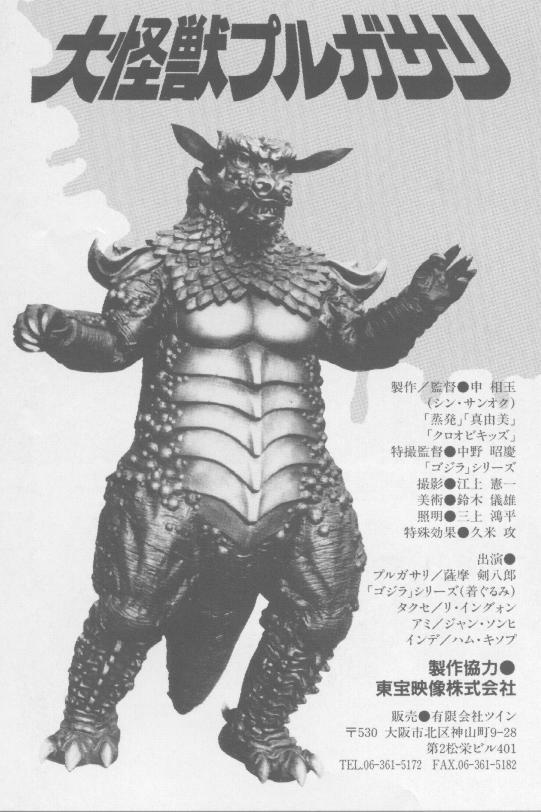Pulgasari~ 1985, Chong Gon Jo and Sang-Ok Shin

In the case of Pulgasari, nothing that happens on film is as important as what happened behind the camera. For reals, you guys.
Pulgasari is a product of North Korea, produced by, and made under the watchful, giant glasses of Kim Jong-Il, then son of fascist dictator Kim-Il Sung. The film’s director, Sang-Ok Shin was a South Korean director who Kim Jong-Il deliberately arranged to be kidnapped and brought back to North Korea with the express purpose of forcing him to craft propaganda films. It’s a set up more than worthy of a film itself, and it really happened.
One of the films brought about through this insane, childish union of sheltered, detestable puppet master and horribly victimized kidnapee is Pulgasari; a confused bit of communist propaganda packaged as a quasi-Godzilla imitation.
As much as the desire to hate this movie because of it’s connection to Kim Jong-Il might motivate critical bias, the truth is that Shin’s directorial talent shines and the film is actually pretty good, and certainly fascinating due to it’s history. It’s rare that a blatant violation of human rights results in a corny monster movie, but this time we got lucky.
THE PLOT- Korea- Villagers toil in fruitless labor, slowly starving to death as their leach like government sucks them dry of resources without the faintest regard for their quality of life. (It’s difficult for me to place what era Pulgasari takes place in. They have no electricity, no medicine, no science and no technology to speak of, and it’s North Korea… So… 1998? I imagine that, throughout Pulgasari, there are people on the other side of the North/South border checking their E-mail.) As the people are slowly beaten down by their corrupt monarchy, a dying, imprisoned blacksmith fashions a tiny golem like figure of a monster out of mud and rice. With his dying breath, he prays to the gods to bring life to his creation, and then they totally do. As rebellion amongst the peasants leads to all out revolution, this small monster begins to devour metal, especially iron, growing exponentially in size and power as he does so. Soon, the all-but invincible beast is discovered and named Pulgasari, and the villagers use his might against their oppressors, eventually leading them to victory.
And for seven or eight minutes, everything is awesome, until the peasants realize that they were only able to achieve this feat due to their use of Pulgasari, whose voracious hunger for precious resources is ultimately unsustainable. Knowing that they lack the ability to satisfy his enormous hunger, the people conclude that ultimately, this responsibility would force them to invade foreign nations, and eventually this would lead to the fall of mankind altogether. Through tragic sacrifice, the Pulgasari is destroyed.
SO, WHAT’S GOING ON HERE- It’s a funny thing, Pulgasari is blatant communist propaganda, with Pulgasari himself serving as a stand in for Capitalism. The message is clear- Capitalism is a destructive force that will motivate societies to war and battle over resources and only by throwing off the shackles of this burden can we hope to achieve global unity and peace… But that message only really comes into focus at the very end of the picture. For the lion’s share of Pulgasari‘s run time, the movie really looks like a strong piece of anti-fascist sentiment, incredibly strange, given the overtly fascist nature of the powers responsible for creating Pulgasari. It really does take a government as obtuse as North Korea’s to use their fascist powers to create anti-fascist propaganda and have no idea why that’s ridiculous. Must be nice, simply ordering a multi-generation execution of anyone who points out the obvious.
So, as a piece of propaganda, the film is successful, but not exactly in the way Kim Jong-Il probably wanted… Or at least, maybe not in the way he would have wanted if the intellectual mechanism needed for him to second guess even his most basic of thoughts hadn’t withered and disappeared from his brain after a lifetime of being surrounded by terrified Yes-Men. I have no doubt this his biding was done to the letter, I just think that he could have realized that the implication against his own regime was clear if he could have thought about it a little more critically. I guess maybe someone could have helped to point that out during the writing process if execution wasn’t a 100% certainty attached to literally any form of criticism whatsoever.
But as a movie, it’s enjoyable, and fairly solid. The rear projection effects look like garbage, but the monster suit is more than passable, and Kim Jong-Il’s absolute control over his subjects and complete disregard for their safety helped net him some pretty impressive sweeping battlefield shots. One criticism, however- I was shocked to learn this movie was shot in the mid-eighties. It looks on par with Toho productions of the early sixties. I would have expected more cutting edge work from a hostage with a gun to his head.
Pulgasari is, strangely, an enjoyable experience, and the propaganda is blatant enough so as to fail at being effectively subversive. I’d say the circumstances around it make it pretty relevant, and it’s not even terrible. I recommend it to kaiju fans, and would say that it’s required viewing for fans of Mondo Macabro style bizarre world cinema.
B-
